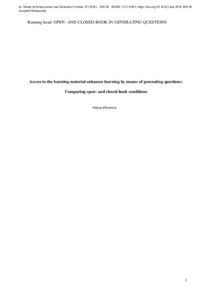| dc.date.accessioned | 2021-10-25T14:09:22Z | |
| dc.date.available | 2021-10-25T14:09:22Z | |
| dc.date.issued | 2020 | |
| dc.identifier | doi:10.17170/kobra-202108234626 | |
| dc.identifier.uri | http://hdl.handle.net/123456789/13323 | |
| dc.language.iso | eng | eng |
| dc.rights | Urheberrechtlich geschützt | |
| dc.rights.uri | https://rightsstatements.org/page/InC/1.0/ | |
| dc.subject | question generation | eng |
| dc.subject | closed-book | eng |
| dc.subject | open-book | eng |
| dc.subject | long-term retention | eng |
| dc.subject | retrieval practice | eng |
| dc.subject | University learning | eng |
| dc.subject.ddc | 150 | |
| dc.title | Access to the learning material enhances learning by means of generating questions: Comparing open- and closed-book conditions | eng |
| dc.type | Aufsatz | |
| dcterms.abstract | Generating questions referring to the learning material is a powerful learning strategy. The present study investigated potential mechanisms behind this effect. Students (N=231) read a text and then generated questions referring to the text in three conditions: (1) open-book (i.e., text accessible), (2) closed-book (i.e., text inaccessible), and (3) cued closed-book (i.e., text inaccessible but keywords provided). After one week, students’ knowledge gain was larger in the open-book and cued closed-book conditions compared to a restudy control condition. No difference emerged between the closed-book and the restudy condition. The number of generated questions was positively correlated with students’ knowledge gain, whereas question depth was not. Results suggest that the effect of question generation may not be attributed to retrieval practice or higher-order thinking. More probably, rephrasing and learners’ active engagement with the learning material, as reflected by the number of generated questions, might contribute to the effect. | eng |
| dcterms.accessRights | open access | |
| dcterms.creator | Ebersbach, Mirjam | |
| dc.relation.doi | doi:10.1016/j.tine.2020.100130 | |
| dc.subject.swd | Hochschule | ger |
| dc.subject.swd | Lehre | ger |
| dc.subject.swd | Lerntest | ger |
| dc.subject.swd | Lernpsychologie | ger |
| dc.subject.swd | Wissenserwerb | ger |
| dc.type.version | acceptedVersion | |
| dcterms.source.identifier | eissn:2211-9493 | |
| dcterms.source.identifier | issn:2452-0837 | |
| dcterms.source.journal | Trends in Neuroscience and Education | eng |
| dcterms.source.volume | Volume 19 | |
| kup.iskup | false | |
| dcterms.source.articlenumber | 100130 | |

